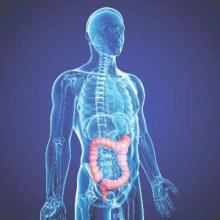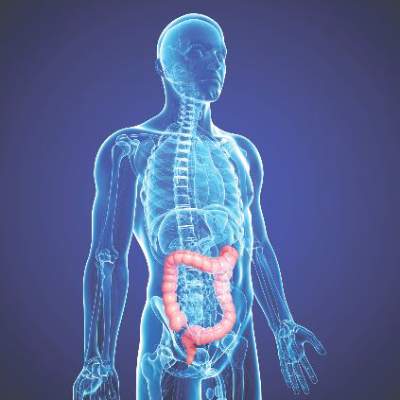User login
To better assess patients being considered for clinical trials, researchers determined that the risk of early mortality was low overall, but elderly patients and those with performance score (PS) of 2 or greater had particularly high risk. In addition, a large proportion of deaths within 6 months occurred in patients with early recurrence.
Mortality rates at 30, 60, and 90 days, and 6 months were 0.3%, 0.6%, 0.8%, and 1.4%, respectively, and age and PS were significantly associated with mortality at every time point (P less than .001 for all). The highest early mortality rates were observed in patients treated with surgery alone: from 0.6% at 30 days to 2.0% at 6 months. The lowest mortality rates occurred in patients treated with FOLFOX (infusional fluorouracil, leucovorin, and oxaliplatin), ranging from 0.2% to 1.2% (J Clin Onc. 2016 Feb 7. doi: 10.1200/JCO.205.65.1158).
Patients who experienced early recurrence had an 82-fold increased risk of early death and accounted for 40% of all deaths prior to 6 months post–random assignment.
“Contrary to the general assumption that systemic therapy exerts its effect mainly by reducing late recurrences, this observation suggests that chemotherapy may also prevent early recurrences, even within the first six months of treatment. Our current finding that nearly one half of the observed early deaths were preceded by a documented recurrence supports this hypothesis,” wrote Dr. Winson Cheung of the division of medical oncology at the British Columbia Cancer Agency, Vancouver.
The analysis used the ACCENT (Adjuvant Colon Cancer Endpoints) database of 37,568 patients with colon cancer who had participated in 25 adjuvant phase III trials since 1977.
The association between advanced age and early mortality was nonlinear and increased sharply beyond 70 years. In addition to age and PS, other patient characteristics that influenced risk of early mortality were tumor grade, lymph node ratio, and tumor stage. Results of the multivariate analysis contributed to development of a nomogram for 6-month mortality. Using external validation data from 3,227 patients, the nomogram correctly predicted the 1.1% mortality rate observed at 6 months.
By quantifying risk of early death in potential clinical trial patients, the nomogram informs risk-to-benefit assessments and identifies individuals for whom increased vigilance may be necessary throughout a study.
To better assess patients being considered for clinical trials, researchers determined that the risk of early mortality was low overall, but elderly patients and those with performance score (PS) of 2 or greater had particularly high risk. In addition, a large proportion of deaths within 6 months occurred in patients with early recurrence.
Mortality rates at 30, 60, and 90 days, and 6 months were 0.3%, 0.6%, 0.8%, and 1.4%, respectively, and age and PS were significantly associated with mortality at every time point (P less than .001 for all). The highest early mortality rates were observed in patients treated with surgery alone: from 0.6% at 30 days to 2.0% at 6 months. The lowest mortality rates occurred in patients treated with FOLFOX (infusional fluorouracil, leucovorin, and oxaliplatin), ranging from 0.2% to 1.2% (J Clin Onc. 2016 Feb 7. doi: 10.1200/JCO.205.65.1158).
Patients who experienced early recurrence had an 82-fold increased risk of early death and accounted for 40% of all deaths prior to 6 months post–random assignment.
“Contrary to the general assumption that systemic therapy exerts its effect mainly by reducing late recurrences, this observation suggests that chemotherapy may also prevent early recurrences, even within the first six months of treatment. Our current finding that nearly one half of the observed early deaths were preceded by a documented recurrence supports this hypothesis,” wrote Dr. Winson Cheung of the division of medical oncology at the British Columbia Cancer Agency, Vancouver.
The analysis used the ACCENT (Adjuvant Colon Cancer Endpoints) database of 37,568 patients with colon cancer who had participated in 25 adjuvant phase III trials since 1977.
The association between advanced age and early mortality was nonlinear and increased sharply beyond 70 years. In addition to age and PS, other patient characteristics that influenced risk of early mortality were tumor grade, lymph node ratio, and tumor stage. Results of the multivariate analysis contributed to development of a nomogram for 6-month mortality. Using external validation data from 3,227 patients, the nomogram correctly predicted the 1.1% mortality rate observed at 6 months.
By quantifying risk of early death in potential clinical trial patients, the nomogram informs risk-to-benefit assessments and identifies individuals for whom increased vigilance may be necessary throughout a study.
To better assess patients being considered for clinical trials, researchers determined that the risk of early mortality was low overall, but elderly patients and those with performance score (PS) of 2 or greater had particularly high risk. In addition, a large proportion of deaths within 6 months occurred in patients with early recurrence.
Mortality rates at 30, 60, and 90 days, and 6 months were 0.3%, 0.6%, 0.8%, and 1.4%, respectively, and age and PS were significantly associated with mortality at every time point (P less than .001 for all). The highest early mortality rates were observed in patients treated with surgery alone: from 0.6% at 30 days to 2.0% at 6 months. The lowest mortality rates occurred in patients treated with FOLFOX (infusional fluorouracil, leucovorin, and oxaliplatin), ranging from 0.2% to 1.2% (J Clin Onc. 2016 Feb 7. doi: 10.1200/JCO.205.65.1158).
Patients who experienced early recurrence had an 82-fold increased risk of early death and accounted for 40% of all deaths prior to 6 months post–random assignment.
“Contrary to the general assumption that systemic therapy exerts its effect mainly by reducing late recurrences, this observation suggests that chemotherapy may also prevent early recurrences, even within the first six months of treatment. Our current finding that nearly one half of the observed early deaths were preceded by a documented recurrence supports this hypothesis,” wrote Dr. Winson Cheung of the division of medical oncology at the British Columbia Cancer Agency, Vancouver.
The analysis used the ACCENT (Adjuvant Colon Cancer Endpoints) database of 37,568 patients with colon cancer who had participated in 25 adjuvant phase III trials since 1977.
The association between advanced age and early mortality was nonlinear and increased sharply beyond 70 years. In addition to age and PS, other patient characteristics that influenced risk of early mortality were tumor grade, lymph node ratio, and tumor stage. Results of the multivariate analysis contributed to development of a nomogram for 6-month mortality. Using external validation data from 3,227 patients, the nomogram correctly predicted the 1.1% mortality rate observed at 6 months.
By quantifying risk of early death in potential clinical trial patients, the nomogram informs risk-to-benefit assessments and identifies individuals for whom increased vigilance may be necessary throughout a study.
FROM JOURNAL OF CLINICAL ONCOLOGY
Key clinical point: Among patients with colon cancer enrolled in phase III trials for adjuvant therapy, mortality within 6 months of random assignment was low overall, but it was significantly higher among elderly or patients with poor performance status.
Major finding: Mortality rates at 30, 60, and 90 days, and 6 months were 0.3%, 0.6%, 0.8%, and 1.4%, respectively, and age and PS were significantly associated with morality at every time point (P less than .001 for all).
Data source: ACCENT database included information on more than 37,568 patients with colon cancer who participated in 25 adjuvant, phase III trials since 1977.
Disclosures: Dr. Cheung reported having no disclosures. Several of his coauthors reported ties to industry.

